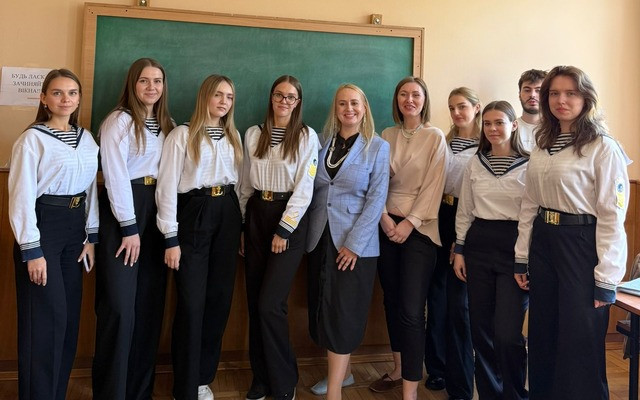
Law students learned about the Czech experience of statehood and lessons for Ukraine

The Czech Republic has proven that an effective constitutional system is possible even after the loss of statehood and prolonged periods of external dependence. For Ukraine, this experience is an important benchmark in strengthening the rule of law and developing democratic institutions.
Olena Maksymenko, representative of the Ukrainian National Bar Association in Prague, spoke about the constitutional system and legal system of the Czech Republic during a lecture for law students at the National University «Odessa Maritime Academy».
Today, more than 500,000 Ukrainian citizens live in the Czech Republic, 380,000 of whom are under temporary protection. For a country with an area of 78,800 square kilometers and a population of 10.6 million, this presence is significant. It creates conditions for mutual influence and exchange of experience.
O. Maksymenko recalled that the Constitution of the Czech Republic was adopted on December 16, 1992. A distinctive feature is the existence of the Declaration of Fundamental Rights and Freedoms as a separate document with constitutional force. Amendments to the Constitution are adopted by constitutional laws with a qualified majority (3/5 of deputies and 3/5 of senators). This procedure also applies to the ratification of international treaties.
Power is divided into legislative, executive, and judicial branches. Legislative power is vested in a bicameral Parliament, which consists of the Chamber of Deputies, with 200 members elected for four years under a proportional system, and the Senate, with 81 members elected for six years under a majority system, with one-third of the members rotating every two years.
Executive power is vested in the President and the Government. The President is elected by direct vote for a term of five years (no more than two terms). He appoints the Prime Minister, judges of the Constitutional and Supreme Courts, has the right of amnesty, and performs the functions of supreme commander-in-chief.
The Government, headed by the Prime Minister, is the highest executive authority and is accountable to the Chamber of Deputies.
The Constitutional Court consists of 15 judges appointed by the President for a term of 10 years. The court considers constitutional complaints, reviews laws for constitutionality, decides on the dissolution of parties, and ensures the enforcement of international court decisions.
The sources of law are normative legal acts, international treaties, which, after ratification, take precedence over national legislation, decisions of the Constitutional Court, and EU law.
Case law and doctrine play a supporting rather than a normative role, which emphasizes the continental tradition.
The country's Constitution separately identifies institutions for the control and protection of rights, which include the Supreme Audit Office, which controls the use of public funds. The Czech National Bank, which is responsible for supervising currency stability, and the Ombudsman's Office, which is an independent human rights protection body, have a separate focus on protecting the rights of children.
«The Czech Republic is an example of a state that has repeatedly lost and regained its statehood. From the elimination of the independence of the lands of the Czech Crown within Austria-Hungary to the creation of Czechoslovakia, the collapse of the First Republic, the period of Nazi occupation and Soviet influence, the path to independence was long and difficult, - commented O. Maksymenko on the importance of the lecture topic. - This experience is relevant for our country because it shows how even in the most difficult historical conditions, it is possible to revive effective parliamentary democracy».
The lecturer also reminded the audience that the Czech Republic has given the world many figures who have influenced the course of world history and culture: the modernist writer Franz Kafka, the dissident and president Václav Havel, the Oscar-winning film director Miloš Forman, and the diplomat Madeleine Albright, the first female Secretary of State of the USA.
© 2025 Unba.org.ua Всі права захищені
"Національна Асоціація Адвокатів України". Передрук та інше використання матеріалів, що розміщені на даному веб-сайті дозволяється за умови посилання на джерело. Інтернет-видання та засоби масової інформації можуть використовувати матеріали сайту, розміщувати відео з офіційного веб-сайту Національної Асоціації Адвокатів України на власних веб-сторінках, за умови гіперпосилання на офіційний веб-сайт Національної Асоціації Адвокатів України. Заборонено передрук та використання матеріалів, у яких міститься посилання на інші інтернет-видання та засоби масової інформації. Матеріали позначені міткою "Реклама", публікуються на правах реклами.